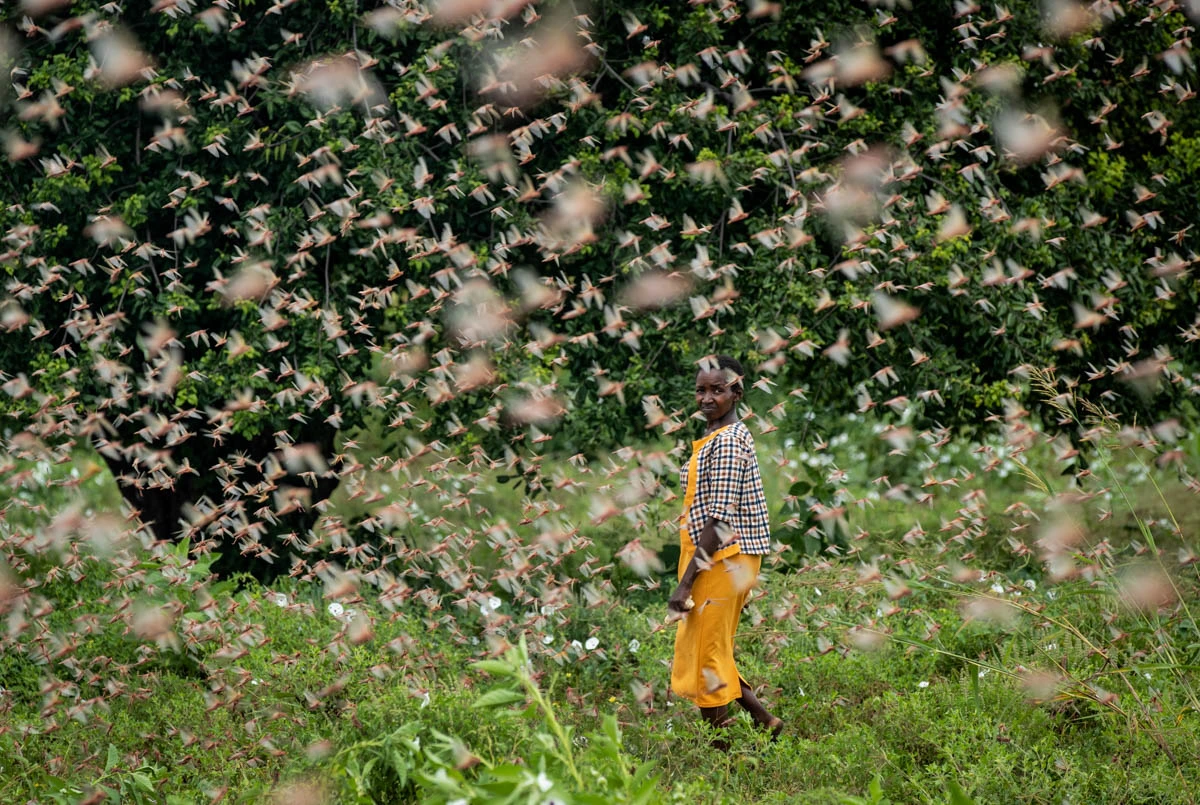Headlines
East Africa, Horn of Africa Prepare for Worst Drought in Decades

By Derrick Bangura
Agricultural workers in the east and Horn of Africa are preparing for their most severe drought in 40 years, as authorities warn that higher temperatures and less than normal rainfall was recorded by weather agencies in March and April this year.
The Intergovernmental Authority on Development said rains will likely fail for a fourth consecutive year, triggering fears of increased cases of malnutrition, threats to livelihoods and severe risks for 29 million people in the region. Meteorologists are linking the unfolding drought to human-caused climate change which is leading to increased warming in the Indian Ocean, causing more frequent cyclones.
Like most of Africa, the east and the Horn’s economic mainstay is agriculture, which is rain-fed, making it vulnerable to extreme weather events. Mama Charity Kimaru, who practices mixed farming by rearing livestock and planting cereals and vegetables in her 30-acre farm in Nyandarua, some 80 miles (126 kilometers) north of Nairobi, is among the farmers who are preparing for the worst outcomes. Kimaru says that increased temperatures recorded over the past few months have denied her livestock pasture and the crops she had planted in anticipation of the long rains season have failed.
The weather agency previously said in February that the region should prepare for a “wetter than average” long rains season, which normally pours from March to May, but the agency revised its previous forecasts this week.
“The March, April, May rains are crucial for the region and, sadly, we are looking at not just three, but potentially four consecutive failed seasons,” Workneh Gebeyehu, the executive secretary of the intergovernmental agency, said. “This, coupled with other stress factors such as conflicts in both our region and Europe, the impact of COVID-19, and macro-economic challenges, has led to acute levels of food insecurity across the greater Horn of Africa.”
Below average rainfall for 2022 are likely to prolong the already extremely dry conditions which have not been experienced to this degree since 1981. Ethiopia, Kenya and Somalia — which will be severely impacted by the reduced rains — are already in the midst of a dire famine.
Lack of rainfall during the short rains season late last year and the ongoing drought during the current long rains season has already led to crop failures and livestock deaths, causing high food prices and intercommunal conflicts over scarce pasture and dwindling water resources.
“Whenever we have intense cyclones in the Southwest Indian Ocean, we always prepare for a long drought season in eastern and the Horn regions,” Evans Mukolwe, the former science director at the U.N., said. “This is because the cyclones suck much of the moisture depriving the region of the much-needed precipitation. It has been the pattern for decades.”
Aid organizations are already concerned about how worsening climate change impacts will affect the region in future decades.
“This is not the Horn’s first drought, nor is it likely to be its last,” said Sean Granville-Ross, the regional director for Africa for the aid agency Mercy Corps. “As the climate emergency worsens, droughts will become more frequent and severe. People affected by climate change cannot wait for one crisis to end before preparing for the next.”
“The international response must prioritize immediate needs while allocating additional resources to long-term, smart interventions that will result in long-term change and assist communities in becoming more drought-resistant.”
The U.N. humanitarian office warned last week that the current drought “risks becoming one of the worst climate induced emergencies in recent history in the Horn of Africa.” It also said that the $1.5 billion drought response appeal required to assist some 5.5 million people in Somali remains seriously underfunded.
Headlines
Noble Ladies Champion Women’s Financial Independence at Grand Inauguration in Abuja

Women from diverse backgrounds across Nigeria and beyond gathered at the Art and Culture Auditorium, Abuja, for the inauguration and convention of the Noble Ladies Association. The event, led by the association’s Founder and “visionary and polished Queen Mother,” Mrs. Margaret Chigozie Mkpuma, was a colourful display of feminine elegance, empowerment, and ambition.
The highly anticipated gathering, attended by over 700 members and counting, reflected the association’s mission to help women realise their potential while shifting mindsets away from dependency and over-glamorization of the ‘white collar job.’ According to the group, progress can be better achieved through innovation and creativity. “When a woman is able to earn and blossom on her own she has no reason to look at herself as a second fiddle,” the association stated.
One of the association’s standout initiatives is its women-only investment platform, which currently offers a minimum entry of ₦100,000 with a return of ₦130,000 over 30 days—an interest rate of 30 percent. Some members invest as much as ₦1 million, enjoying the same return rate. Mrs. Mkpuma explained that the scheme focuses on women because “women bear the greater brunt of poverty” and the platform seeks “to offer equity in the absence of economic equality.”
Education is also central to the Noble Ladies’ mission, regardless of age. Their mantra, “start again from where you stopped,” encourages women to return to school or upgrade their skills at any stage in life. The association believes that financial stability is vital in protecting women from cultural practices that dispossess widows of their late husbands’ assets, while also enabling them to raise morally and socially grounded families.
Founded on the vision of enhancing women’s skills and achieving financial stability, the association rests on a value system that discourages pity and promotes purpose. “You have a purpose and you build on that purpose to achieve great potentials and emancipation,” Mrs. Mkpuma said.
A criminologist by training and entrepreneur by practice, she cautions against idleness while waiting for formal employment. “There are billions in the informal and non-formal sectors waiting to be made,” she said, rejecting the “new normal of begging” and urging people to “be more introspective to find their purpose in life and hold on to it.”
Mrs. Mkpuma’s management style keeps members actively engaged, focusing on vocational skills and training to prepare them for competitive markets. She is exploring “innovative integration of uncommon technologies” and is already in talks with international franchises to invest in Nigeria, with Noble Ladies as first beneficiaries.
The association’s core values include mutual respect, innovation, forward-thinking, equal opportunity, and financial emancipation. With plans underway to establish a secretariat in the heart of Abuja, the group aims to expand its impact.
The event drew high-profile guests, including former Inspector General of Police, Mike Okiro, and a host of VIPs, marking a significant milestone in the association’s drive for women’s empowerment.
Headlines
NEPZA, FCT agree to create world-class FTZ environment

The Nigeria Export Processing Zones Authority (NEPZA) has stepped in to resolve the dispute between the Federal Capital Territory Administration and the Abuja Technology Village (ATV), a licensed Free Trade Zone, over the potential revocation of the zone’s land title.
Dr. Olufemi Ogunyemi, the Managing Director of NEPZA, urged ATV operators and investors to withdraw the lawsuit filed against the FCT administration immediately to facilitate a roundtable negotiation.
Dr. Ogunyemi delivered the charge during a courtesy visit to the Minister of the Federal Capital Territory, Barrister Nyesom Wike, on Thursday in Abuja.
You will recall that the ATV operators responded to the revocation notice issued by the FCT administration with a lawsuit.
Dr. Ogunyemi stated that the continued support for the growth of the Free Trade Zones Scheme would benefit the nation’s economy and the FCT’s development, emphasizing that the FCT administration recognized the scheme’s potential to accelerate industrialisation.
Dr. Ogunyemi, also the Chief Executive Officer of NEPZA, expressed his delight at the steps taken by the FCT minister to expand the economic frontier of the FCT through the proposed Abuja City Walk (ACW) project.
Dr. Ogunyemi further explained that the Authority was preparing to assess all the 63 licensed Free Trade Zones across the country with the view to vetting their functionality and contributions to the nation’s Foreign Direct Investment and export drives.
“I have come to discuss with His Excellency, the Minister of the Federal Capital Territory on the importance of supporting the ATV to succeed while also promoting the development of the Abuja City Walk project. We must work together to achieve this for the good of our nation,” he said.
On his part, the FCT Minister reiterated his unflinching determination to work towards President Bola Ahmed Tinubu’s Renewed Hope Agenda by bringing FDI to the FCT.
“We must fulfil Mr. President’s promises regarding industrialization, trade, and investment. In this context, the FCT will collaborate with NEPZA to review the future of ATV, a zone that was sponsored and supported by the FCT administration,” Wike said.
Barrister Wike also said that efforts were underway to fast-track the industrialisation process of the territory with the construction of the Abuja City Walk.
The minister further said the Abuja City Walk project was planned to cover over 200 hectares in the Abuja Technology Village corridor along Airport Road.
According to him, the business ecosystem aimed to create a lively, mixed-use urban center with residential, commercial, retail, hospitality, medical, and institutional facilities.
He added that the ACW would turn out to be a high-definition and world-class project that would give this administration’s Renewed Hope Agenda true meaning in the North-Central Region of the country.
Barrister Wike also indicated his continued pursuit of land and property owners who failed to fulfil their obligations to the FCT in his determination to develop the territory.
Headlines
Benue IDPs block highway, demand return to ancestral homes

Vehicular movement along the Yelwata axis of the Benue–Nasarawa highway was brought to a standstill on Wednesday as Internally Displaced Persons, IDPs, staged a protest, demanding immediate return to their ancestral homes.
The protesters, believed to be victims of persistent attacks by suspected herdsmen, blocked both lanes of the busy highway for several hours, chanting “We want to go back home”.
The protest caused disruption, leaving hundreds of motorists and passengers stranded.
Eyewitnesses said the displaced persons, many of whom have spent years in overcrowded IDP camps, are expressing deep frustration over the government’s delay in restoring security to their communities.
“We have suffered enough. We want to return to our homes and farms,” one of the protesters told reporters at the scene.
Security personnel were reportedly deployed to monitor the situation and prevent any escalation, though tensions remained high as of press time.
Efforts to reach the Benue State Emergency Management Agency, SEMA, and other relevant authorities for comment were unsuccessful.
-

 Headlines4 years ago
Headlines4 years agoFacebook, Instagram Temporarily Allow Posts on Ukraine War Calling for Violence Against Invading Russians or Putin’s Death
-

 Headlines4 years ago
Headlines4 years agoNigeria, Other West African Countries Facing Worst Food Crisis in 10 Years, Aid Groups Say
-

 Foreign3 years ago
Foreign3 years agoNew York Consulate installs machines for 10-year passport
-

 News1 year ago
News1 year agoZero Trust Architecture in a Remote World: Securing the New Normal
-

 Entertainment3 years ago
Entertainment3 years agoPhyna emerges winner of Big Brother Naija Season 7
-

 Headlines1 year ago
Headlines1 year agoNigeria Customs modernisation project to check extortion of traders
-

 Economy2 years ago
Economy2 years agoWe generated N30.2 bn revenue in three months – Kano NCS Comptroller
-

 Entertainment2 years ago
Entertainment2 years agoMovie download platform, Netnaija, announces closure
















